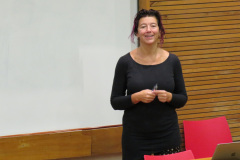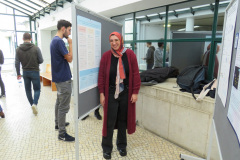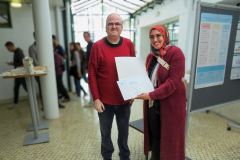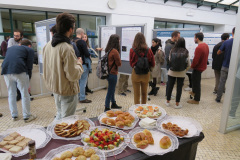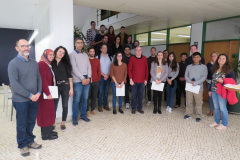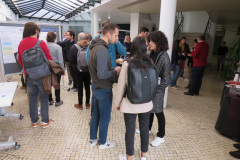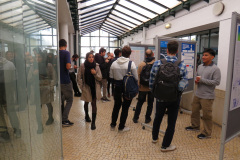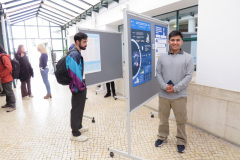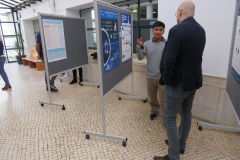Best Poster in AR/VR Accessibility
Instituto Superior Técnico’s Department of Computer Science recently hosted the annual PhD DEI event, bringing together a diverse group of doctoral students from various stages in the Doctoral Program in Computer Science and Engineering and the Doctoral Program in Digital Media. Among the standout participants from the Interactive Technologies Institute (ITI), Noha Mokhtar emerged as a shining star, securing the Best Poster Award for her groundbreaking research.
The event provided a platform for students to exhibit their research through poster presentations, fostering a relaxed yet intense atmosphere conducive to the exchange of experiences and knowledge sharing. ITI’s robust representation, including professors Augusto Esteves, Valentina Nisi, Hugo Nicolau, Daniel Lopes, and several fellow PhD presenters, underscored the institute’s commitment to active engagement within the academic and professional community.
One of the event’s highlights was Noha’s recognition with the Best Poster Award. Her research, supervised by Prof. Augusto Esteves, addresses a crucial issue in Augmented Reality (AR) and Virtual Reality (VR).
Identifying a Challenge in AR/VR Accessibility
Noha’s research pinpointed a pervasive problem in the current design of AR/VR interfaces – the inadvertent exclusion of individuals with limited mobility due to the reliance on controllers or manual hand interactions.
In response to this challenge, Noha developed a groundbreaking eye-gaze interaction technique. This technique aims to revolutionize the user experience within VR by facilitating interaction exclusively through eye gaze, eliminating the need for controllers and manual hand interactions. The goal is to enhance the sense of embodiment and presence within the virtual environment.
If successful, Noha’s research could have profound societal implications. The eye-gaze selection method has the potential to democratize VR interaction, making it universally accessible and inclusive. “By enabling these individuals to interact with virtual environments through a straightforward eye-gaze selection method, my research seeks to elevate their experience within Virtual Reality (VR),” Noha highlighted.
As the research progresses, Noha is gearing up for testing and welcoming participants interested in contributing to the study in Beato Creative Hub. Looking ahead, she envisions expanding the scope of her work by incorporating machine learning to develop various interactions specifically tailored for individuals with limited mobility. “The journey is ongoing, and I’m excited about the potential positive implications this research may have on inclusivity within immersive technologies,” concluded Noha.
Student community favourites
The PhD DEI also hosted a community poll that allowed the student community to vote for the best poster. The poll results have also brought recognition for the Interactive Technologies Institute. The student community has elected Adrian Leon’s poster as their favourite. His research poster is titled User-centered Training Pipeline for Brain-computer Interfaces: Towards Holistic Tools for Device Control and is supervised by Augusto Esteves. Marta Ferreira, another PhD student supervised by Nuno Nunes and Valentina Nisi, got second place in the poll with her work “Leveraging Data Humanism and Human-computer Interaction for Climate Change Engagement”.
